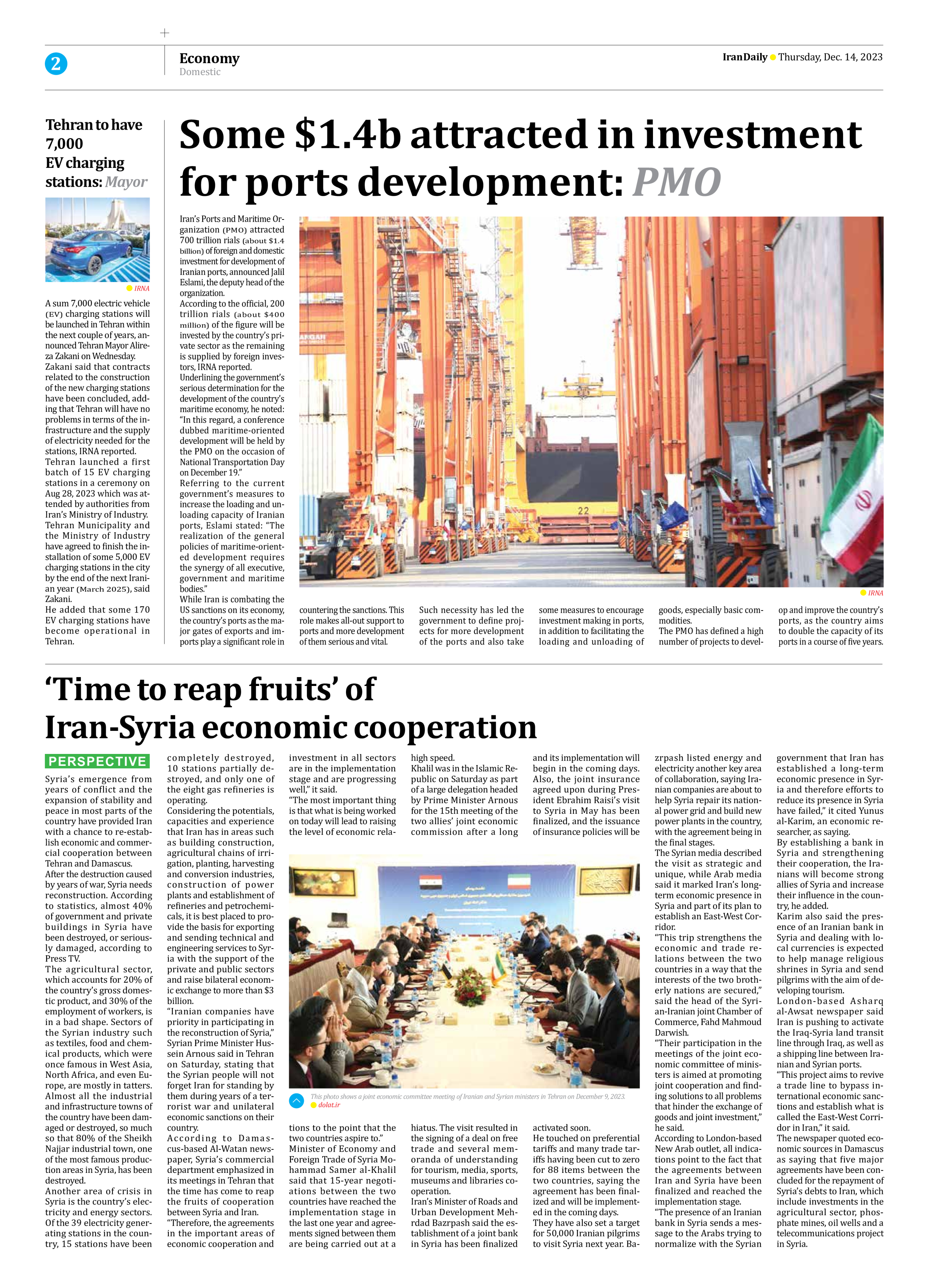
‘Time to reap fruits’ of Iran-Syria economic cooperation
Syria’s emergence from years of conflict and the expansion of stability and peace in most parts of the country have provided Iran with a chance to re-establish economic and commercial cooperation between Tehran and Damascus.
After the destruction caused by years of war, Syria needs reconstruction. According to statistics, almost 40% of government and private buildings in Syria have been destroyed, or seriously damaged, according to Press TV.
The agricultural sector, which accounts for 20% of the country’s gross domestic product, and 30% of the employment of workers, is in a bad shape. Sectors of the Syrian industry such as textiles, food and chemical products, which were once famous in West Asia, North Africa, and even Europe, are mostly in tatters. Almost all the industrial and infrastructure towns of the country have been damaged or destroyed, so much so that 80% of the Sheikh Najjar industrial town, one of the most famous production areas in Syria, has been destroyed.
Another area of crisis in Syria is the country’s electricity and energy sectors. Of the 39 electricity generating stations in the country, 15 stations have been completely destroyed, 10 stations partially destroyed, and only one of the eight gas refineries is operating.
Considering the potentials, capacities and experience that Iran has in areas such as building construction, agricultural chains of irrigation, planting, harvesting and conversion industries, construction of power plants and establishment of refineries and petrochemicals, it is best placed to provide the basis for exporting and sending technical and engineering services to Syria with the support of the private and public sectors and raise bilateral economic exchange to more than $3 billion.
“Iranian companies have priority in participating in the reconstruction of Syria,” Syrian Prime Minister Hussein Arnous said in Tehran on Saturday, stating that the Syrian people will not forget Iran for standing by them during years of a terrorist war and unilateral economic sanctions on their country.
According to Damascus-based Al-Watan newspaper, Syria’s commercial department emphasized in its meetings in Tehran that the time has come to reap the fruits of cooperation between Syria and Iran.
“Therefore, the agreements in the important areas of economic cooperation and investment in all sectors are in the implementation stage and are progressing well,” it said.
“The most important thing is that what is being worked on today will lead to raising the level of economic relations to the point that the two countries aspire to.”
Minister of Economy and Foreign Trade of Syria Mohammad Samer al-Khalil said that 15-year negotiations between the two countries have reached the implementation stage in the last one year and agreements signed between them are being carried out at a high speed.
Khalil was in the Islamic Republic on Saturday as part of a large delegation headed by Prime Minister Arnous for the 15th meeting of the two allies’ joint economic commission after a long hiatus. The visit resulted in the signing of a deal on free trade and several memoranda of understanding for tourism, media, sports, museums and libraries cooperation.
Iran’s Minister of Roads and Urban Development Mehrdad Bazrpash said the establishment of a joint bank in Syria has been finalized and its implementation will begin in the coming days. Also, the joint insurance agreed upon during President Ebrahim Raisi’s visit to Syria in May has been finalized, and the issuance of insurance policies will be activated soon.
He touched on preferential tariffs and many trade tariffs having been cut to zero for 88 items between the two countries, saying the agreement has been finalized and will be implemented in the coming days.
They have also set a target for 50,000 Iranian pilgrims to visit Syria next year. Bazrpash listed energy and electricity another key area of collaboration, saying Iranian companies are about to help Syria repair its national power grid and build new power plants in the country, with the agreement being in the final stages.
The Syrian media described the visit as strategic and unique, while Arab media said it marked Iran’s long-term economic presence in Syria and part of its plan to establish an East-West Corridor.
“This trip strengthens the economic and trade relations between the two countries in a way that the interests of the two brotherly nations are secured,” said the head of the Syrian-Iranian joint Chamber of Commerce, Fahd Mahmoud Darwish.
“Their participation in the meetings of the joint economic committee of ministers is aimed at promoting joint cooperation and finding solutions to all problems that hinder the exchange of goods and joint investment,” he said.
According to London-based New Arab outlet, all indications point to the fact that the agreements between Iran and Syria have been finalized and reached the implementation stage.
“The presence of an Iranian bank in Syria sends a message to the Arabs trying to normalize with the Syrian government that Iran has established a long-term economic presence in Syria and therefore efforts to reduce its presence in Syria have failed,” it cited Yunus al-Karim, an economic researcher, as saying.
By establishing a bank in Syria and strengthening their cooperation, the Iranians will become strong allies of Syria and increase their influence in the country, he added.
Karim also said the presence of an Iranian bank in Syria and dealing with local currencies is expected to help manage religious shrines in Syria and send pilgrims with the aim of developing tourism.
London-based Asharq al-Awsat newspaper said Iran is pushing to activate the Iraq-Syria land transit line through Iraq, as well as a shipping line between Iranian and Syrian ports.
“This project aims to revive a trade line to bypass international economic sanctions and establish what is called the East-West Corridor in Iran,” it said.
The newspaper quoted economic sources in Damascus as saying that five major agreements have been concluded for the repayment of Syria’s debts to Iran, which include investments in the agricultural sector, phosphate mines, oil wells and a telecommunications project in Syria.







